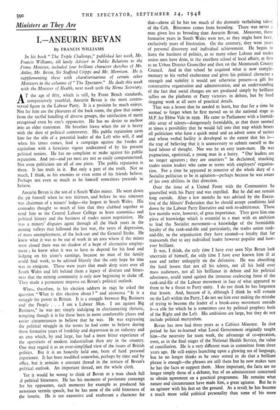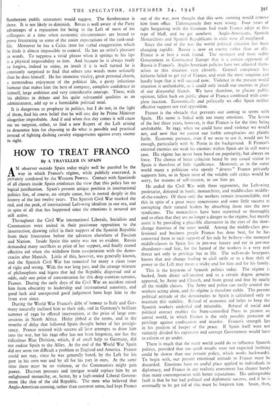Ministers as They Are
1.-ANEURIN BEVAN
By FRANCIS WILLIAMS In his book "The Triple Challenge," published last week, Mr. Francis Williams, till lately Adviser in Public Relations to the Prime Minister, included four brilliant character sketches of Mr. Attlee, Mr. Bevin, Sir Stafford Cripps and Mr. Morrison. He is supplementing these with charatterisations of certain other Ministers in the columns of " The Spectator." He deals this week with the Minister of Health, next week with the Home Secretary.
AT the age of fifty, which is still, by Front Bench standards, comparatively youthful, Aneurin Bevan is the most contro- versial figure in the Labour Party. It is a position he much enjoys. Not for him are the pleasures of the back room, the glow that comes from the tactful handling of diverse groups, the satisfaction of merit recognised even by one's opponents. He has no desire to mellow into an elder statesman. He breathes freest when the air is heavy with the dust of political controversy. His public reputation casts him for the role of a potential leader of the Left who will, if and when his times comes, lead a campaign against the bordes of capitalism with a ferocious vigour undreamed of by his present political seniors. He has no complaint to make against his public reputation. And yet—and yet men are not so easily compartmented. Not even politicians are all of one piece. The public reputation is there. It has truth in it. But only a part of the truth. Not so much, I think, as his enemies or even some of his friends believe. Perhaps not even so much as he himself sometimes pretends to believe.
Aneurin Bevan is the son of a South Wales miner. He went down the pit himself when he was thirteen, and before he was nineteen was chairman of a miners' lodge—the largest in South Wales. His comrades thought so much of him that they clubbed together to send him to the Central Labour College to learn econornit..r and political history and the business of trades union negotiation. He was a miners' disputes agent through all the black years in the mining valleys that followed the last war, the years of depression, of mass unemployment, of the lock-out and the General Strike. He knew what it was to be out of work in an area where if the mines were closed there was no shadow of a hope of alternative employ- ment; he knew what it was to have to depend for his food and lodging on his sister's earnings, because no man of the family could find work, to be advised bluntly that the only hope for him was to emigrate. Those were years that made deep scars over all South Wales and left behind them a legacy of distrust and bitter- ness that the mining community is only now beginning to shake off. They made a permanent impress on Bevan's political outlook.
Whell, therefore, in his election address in 1945 he asked the question "What is this election about ? " and answerea "It is a struggle for power in Britain. It is a struggle between Big Business and the People . . . I am a Labour Man. I am against Big Business," he was no simply indulging in electioneering rhetoric, tempting though it is for those born in more comfortable places and easier circumstances to believe that he was. He was expressing the political struggle in the terms he had come to believe during those formative years of hardship and depression in an industry and an area which, by and large, has had a more bitter experience of the operations of modern industrialism than any in the country. One may regard it as an over-simplified view of the issues of British politics. But it is an honestly held one, born of hard personal experience. It has been modified somewhat, perhaps by time and by office, but it remains a constant thread in the texture of Bevan's political outlook. An important thread, not the whole cloth.
Yet it would be wrong to think of Bevan as a man chock full political bitterness. He has his moments of passionate contempt for his opponents, such moments for example as produced his notorious vermin speech, but he has none of the cold bitterness of the fanatic. He is too expansive and exuberant a character for that—above all he has too much of the dramatic verbalising talent of the Celt. Bitterness comes from brooding. There was never a man given less to brooding than Aneurin Bevan. Moreover, those formative years in South Wales were not, as they might have been, exclusively years of frustration. On the contrary, they were years of personal discovery and individual achievement. He began to learn the business of politics, as so many other Labour and trades union men have done, in the excellent school of local affairs, at first as an Urban District Councillor and then on the Monmouth County Council. And in that school he acquired what is now comple- mentary to his verbal exuberance and gives his political chttracter a strength and stability it would not otherwise possess—a gift for constructive organisation and administration, and an understanding of the fact that social changes are not produced simply by brilliant sallies on the platform or Party victories in debate, but by hard slogging work at all sorts of practical details.
That was a lesson that he needed to learn, but that for a time he seemed to forget when he first moved on to the national stage as M.P. for Ebbw Vale in 1929. He came to Parliament with a formid- able array of talents—dangerously formidable, so that there seemed at times a possibility that he would fall into that trap which besets all politicians who have a quick mind and an adroit sense of tactics and whose verbal facility is developed to the extent that his is— the trap of believing that it is unnecessary to submit oneself to the hard labour of thought. Nor was he an easy team-mate. He was pugnacious, egotistical, a young man in a hurry. "Our leaders are no longer agitators ; they are courtiers" he declaimed, attacking trades union leaders who came to terms with employers' organisa- tion. For a time he appeared to conceive of the whole duty of a Socialist politician to be in agitation—perhaps because he was aware of his own abilities in that direction.
Over the issue of a United Front with the Communists he quarrelled with his Party and was expelled. But he did not remain long outside. After a few months he was advised by the Execu- tive of the Miners' Federation that he should accept conditions laid down by the Labour Party Executive and seek re-admittance. Those few months were, however, of great importance. They gave him one piece of knowledge which is essential to a man with an ambition to lead the Socialist movement—a knowledge of the formidable loyalty of the rank-and-file and particularly, the trades union rank- and-file, to the organisation they have created—a loyalty that far transcends that to any individual leader however popular and how- ever brilliant.
It was, I think, the only time I have ever seen Nye Bevan look uncertain of himself, the only time I have ever known him ill at ease and rather unhappily on the defensive. He was absorbing the hard lesson that not all his talents, not all his hold over mass audiences, not all his brilliance in debate and his political adroitness, could stand against the immense coalescing force of the rank-and-file of the Labour movement in face of what appeared to them to be a threat to Party unity. I do not think he has forgotten that lesson. And, because of it, although I think he will remain on the Left within the Party, I do not see him ever making the mistake of trying to become the leader of a break-away movement outside it—a role for which he is sometimes cast by political prophets both of the Right and the Left. His ambitions are large, but they do not include political martyrdom.
Bevan has now had three years as a Cabinet Minister. In that period he has re-learned what Local Government originally taught him—the necessity for team work, the advantage of co-operation, even, as in the final stages of the National Health Service, the value of conciliation. He is a very different man in committee from three years ago. He still enjoys launching upon a glowing sea of language, but he no longer thinks as he once semed to do that a brilliant phrase is enough—the phrases are still there but he now makes sure he has the facts to support them. More important, the facts are no longer simply those of a debater, but of an administrator concerned to obtain agreement on a practical programme. He remains what nature and circumstance have made him, a great agitator. But he is an agitator with his feet on the ground. As a result he has become a much more solid political personality than some of his more flamboyant public utterances would suggest. The flamboyance is there. It is not likely to diminish. Bevan is well aware of the Party advantages of a reputation for being to the Left of most of his colleagues at a time when economic circumstances are bound to prove frustrating to some of the rosier expectations of the rank-and- file. Moreover he has a Celtic taste for verbal exaggeration which he finds it almost impossible to control. He has an artist's pleasure in words. To suppress a vivid phrase when it springs to his lips is a physical impossibility to him. And because he is always ready to forgive, indeed to enjoy, an insult if it is well turned he is constantly surprised to find that others take words more seriously than he does himself. He has immense vitality, great personal charm, a tremendous enjoyment of the political life, a gusty infectious humour that makes him the best of company, complete confidence in himself, large ambition and very considerable courage. These, with his abilities in debate and his quite substantial qualities as an administrator, add up to a formidable political total.
It is dangerous to prophesy in politics, but I do not, in the light of them, find his own belief that he will one day be Prime Minister altogether improbable. And if and when that day comes it will cause me no surprise,, either, to find a new Rupert of the Left arising to denounce him for choosing to do what is possible and practical instead of fighting dashing cavalry engagements against every enemy in sight.



































 Previous page
Previous page